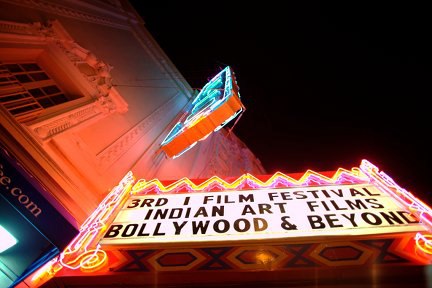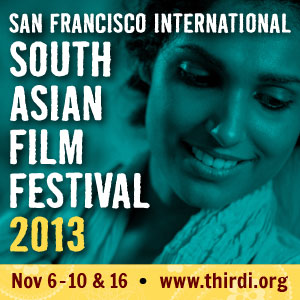 With devotees from across the global South, and entrenched power that rivals Hollywood’s, Indian cinema is a peacock in the international film industry. This year is Bollywood’s 100th anniversary, and plenty of high wattage stars turned out when it was feted at Cannes in May.
With devotees from across the global South, and entrenched power that rivals Hollywood’s, Indian cinema is a peacock in the international film industry. This year is Bollywood’s 100th anniversary, and plenty of high wattage stars turned out when it was feted at Cannes in May.
This year of global adulation is also an opportunity for some sly counterpoints, about the rich diversity of film emerging from the wider South Asian diaspora and the imbalances within Bollywood. To that end, the curation at the San Francisco International South Asian Film Festival this year might ruffle a few peacock feathers.
The SFISAFF is presented by the intrepid media arts organization 3rd i Films. Executive Director Ivan Jaigirdar says representation of women was a driving theme behind this fall’s picks, especially since a century ago, women were absent both as actors and directors. Pakistani cinema and youth-related films are also a priority for 3rd i this year. I spoke to Jaigirdar about what’s in store for San Francisco Bay Area audiences when the festival kicks off this week, and how 3rd i found some of this year’s standout women directors.
 IJ: Given that we’ve been around for about 11 years, we’ve maintained our contacts and networks with all the filmmakers that we’ve shown. Some of them we bring back, like Nishtha Jain is coming, and she’s showing Gulabi Gang. That’s about women vigilantes reacting to patriarchal institutions and misogyny in the context of where they live, in villages. Certain filmmakers we just track. (Jain) sort of comes out with a film a year. And this is perfect timing for us; the theme of the film, the narrative. In other cases it sort of percolates up. It was sort of synchronistic for us this year, that a lot of the filmmakers were women, and we were also looking for that, too. There was a confluence in the air, as it were.
IJ: Given that we’ve been around for about 11 years, we’ve maintained our contacts and networks with all the filmmakers that we’ve shown. Some of them we bring back, like Nishtha Jain is coming, and she’s showing Gulabi Gang. That’s about women vigilantes reacting to patriarchal institutions and misogyny in the context of where they live, in villages. Certain filmmakers we just track. (Jain) sort of comes out with a film a year. And this is perfect timing for us; the theme of the film, the narrative. In other cases it sort of percolates up. It was sort of synchronistic for us this year, that a lot of the filmmakers were women, and we were also looking for that, too. There was a confluence in the air, as it were.
We are also showing Good Morning Karachi by (Sabiha) Sumar. She did a film a few years ago called Silent Waters. That was another woman filmmaker that we had (at the festival previously), and we wanted to show her next film, because Silent Waters was such an amazing film. We’ll be having a discussion at the Castro on November 9th after her film, on the topic of representation. We’ll also have Anusha Rizbi, director of Peepli Live — she’ll be doing the Q&A. We’re also thrilled about Pratibha Parmar. We’re going to be showing her film, Alice Walker: Beauty in Truth — it opens up a totally different bit of the spectrum of what we show of South Asian films at 3rd I.
NK: Maybe we can shift a bit, to the focus on Pakistan. There’s a lot of buzz around These Birds Walk in artist circles, and among critics: mentions of Truffaut, praise of the amazing camera work. Can you talk about what makes this film distinctive?
IJ: It’s such a stellar piece of cinema verite, and comes from the Sundance Institute. It’s really a magical and poetic portrait of Pakistani youth. One of the quotes I remember from one of the film classes I took from Trinh T. Minh-ha at UC Berkeley was, “Lack of ambiguity limits imagination.” This film is beautifully ambiguous and just opens up your imagination. It’s not didactic at all, it’s so open-ended, in a thought provoking way and it’s really one of our favorite films.
NK: Anything that’s shifted, or opportunities that have opened with regard to the financing systems that support the kind of films that you bring to the festival?
IJ: There’s two that come to mind. One is Simple Superstar, directed by Wilbur Sargunaraj. This was completely crowd-financed. He’s a YouTube sensation and did a feature film, sort of autobiographical. It’s a comedy, but very thought-provoking. He’s Canada-based and he’s flying over for his film. Another films is Peddlers — they’re both on that same evening, Friday November 8th at New People in Japantown. Peddlers showed at Cannes Film Festival, and there’s a lot of indie Indian films and (Sri Lankan films, actually) showing at Cannes and they’re through the indie guru Anurag Kashap. They’re percolating up with his backing…and distribution platform. He’s a really well known indie director who’s supporting a lot of young filmmakers coming out of India.
NK: Anything else you’d like to add?
IJ: I would say our local shorts are quite amazing…actually, all the shorts. Before they were just local, but we’ve mixed it in with national and international shorts. One short features the first Indian woman surfer coming out of South India, and other surfing women from there. We have shorts from a variety of countries, and at least three local filmmakers, too.
You can follow Nishat Kurwa on Twitter @nishatjaan.












